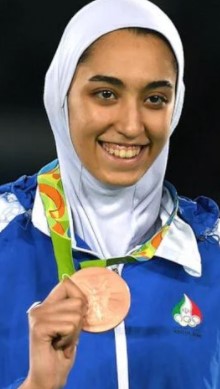February 26, 2021

Kimia Alizadeh, the only female athlete to have won an Olympic medal for Iran, has been granted asylum in Germany. The German Taekwondo Federation described the move as a “great victory” for German Taekwondo and the sporting community in general.
On August 21, 2016, Supreme Leader Ali Khamenehi posted a photograph of Alizadeh on Twitter along with praise in both English and Persian. However, his admiration was not a response to her athletic achievements, but instead for the fact that she wore hejab. “I sincerely thank all the female athletes present on the international stage who wear hejab,” he wrote.
But soon, the same woman joined the ranks of those expressing disgust with Iran’s law making it mandatory for women to cover their hair.
“I am one of the millions of oppressed women in Iran whom authorities have played with as they wished for years. They took me wherever they wanted. I wore everything they said. I repeated every sentence they ordered. They detained me whenever they saw fit. They attributed my medals to the obligatory hejab and attributed them to their own management. I was not important to them. None of us are important to them; we are tools. These medals are important for them to exploit us for politics at any price they set. But at the same time, they say, in an act of humiliation: the virtue of a woman is that she does not stretch her legs.”
Six days after Alizadeh’s Instagram post, the German Taekwondo Federation announced she was seeking asylum in Germany.
Together with her husband, Hamed Madanchi, a former Iranian national volleyball team member, Alizadeh spoke to reporters about why she had taken refuge in Germany.
“The most important thing for me is to have a comfortable life. Apart from winning an Olympic medal and a world championship, and the successes and goals that I have in mind, I look for a peaceful life.”
Alizadeh won a bronze medal at the 2016 Rio de Janeiro Olympics when she was just 18 years old. But after the Olympics, she suffered an injury and, after medical assessment, it emerged that she was suffering from Guillain-Barre syndrome, a rare condition in which the body’s immune system attacks its nerves. Symptoms include muscle weakness, numbness, tingling, and even paralysis.
After this surfaced, the Iranian Taekwondo Federation said it would be unlikely Alizadeh would be able to take part in championship competitions due to her condition, and that her future in the sport was at serious risk. However, she did return, and continued to compete as part of in the Iranian national Taekwondo team.
According to Germany’s Die Nachrichten news agency, Alizadeh will participate in the German Olympic Sports Federation under her refugee status. The Taekwondo Federation is taking steps to register Alizadeh as a member of the Olympic Refugee Team.
Earlier, the German Sailing Federation registered Saeed Fazlouli, a former Iranian national team member who had taken refuge in Germany, as part of the refugee team.
Currently, 52 athletes are confirmed to compete in the Olympics as members of the refugee team. The following five Iranians are confirmed as team members: Taekwondo fighter Ali Noghandoust, who is seeking asylum in Croatia; Amir Mohammad Hosseini, a Tae-kwondo fighter with refugee status in Germany; Dina Poriones Langroudi, Taekwondo fighter and refugee in the Netherlands, Ehsan Naghibzadeh, Iranian taekwondo fighter and refugee in Switzerland, and Kasra Mehdipournejad, Taekwondo fighter, also with refugee status in Germany.























